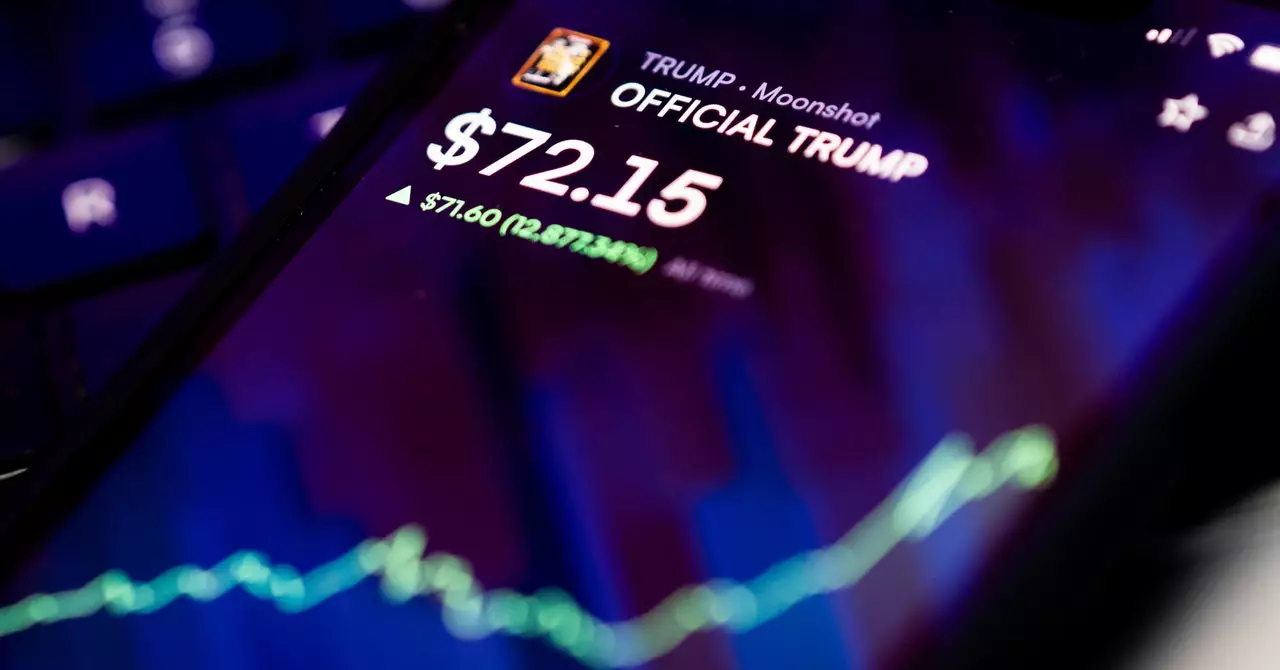In recent years, the cryptocurrency world has witnessed the rise of memecoins—cryptocurrencies that capitalize on internet culture and memes rather than underlying technological advancements. Among the most recent and controversial additions to this category is the TRUMP coin, associated with former President Donald Trump. This memecoin exemplifies the volatility and ethical concerns that typically surround such projects, sparking debate among investors, crypto enthusiasts, and political analysts alike.
Jacob Silverman, a coauthor of “Easy Money: Cryptocurrency, Casino Capitalism, and the Golden Age of Fraud,” raises significant concerns about the TRUMP coin’s structure, suggesting it showcases the classic characteristics of a “pump-and-dump” scheme. This type of cryptocurrency manipulation involves insiders holding a substantial amount of the coin, aggressively promoting it to inflate its value, and then selling off their holdings once the price surges, inevitably leading to steep losses for unsuspecting investors. When an issuer retains up to 80% of their cryptocurrency for themselves, it raises a massive red flag regarding the project’s integrity and sustainability.
The recent launch of Melania Trump’s own memecoin has compounded the negative sentiment surrounding TRUMP coin and its investors. Following the introduction of MELANIA coin, TRUMP token’s value plummeted by 50%. This decline showcased the fragile nature of unofficial Trump-themed cryptocurrencies, leading to significant losses for those who supported these tokens as political statements during the heated 2024 electoral cycle. The MALGA token’s marketing director voiced concerns that the competitive nature of launching these political memecoins constitutes an “egregious money grab,” undermining the principles of trust and support among a candidate’s base.
The impact of such memecoins extends beyond mere financial losses; it highlights a troubling trend in political fundraising and influence. Silverman cautions that large investments in a cryptocurrency tied to a political figure could create undercurrents of bribery or favor-seeking behaviors, potentially leading to a new tier of political manipulation not previously seen in the modern political landscape. As political actors invest in cryptocurrencies linked to Trump, the implications for transparency and ethical governance remain under scrutiny.
The TRUMP coin is emblematic of Trump’s shifting relationship with cryptocurrency. During his first term, he disparaged bitcoin as a “scam,” yet as the 2024 election cycle approached, he pivoted dramatically, presenting himself as the “crypto president.” By engaging with crypto industry heavyweights, Trump attracted substantial donations from this sector by promising to make America the “crypto capital of the planet” and fostering a pro-crypto environment. Such a metamorphosis raises the question of whether the support of influential crypto figures is genuine or merely a strategic move to garner political favor.
Additionally, the approval of ventures like World Liberty Financial, another crypto-related initiative introduced by the Trump family, symbolizes an increasingly blurred line between political power and cryptocurrency endeavors. However, skepticism surrounds this crypto business, with concerns that it may cause significant financial repercussions for individuals involved if it fails or strategically misfires. Indeed, the perilous nature of the crypto market looms large over such initiatives.
As the cryptocurrency landscape evolves, the dynamics surrounding politically affiliated cryptocurrencies raise ethical concerns that are often overlooked. Silverman articulates that without sufficient measures to regulate this nascent market, Trump’s activities resemble those of a typical crypto entrepreneur exploiting loopholes and the lack of oversight in a busy market. Additionally, as Trump shifts regulatory guidelines surrounding the Securities and Exchange Commission (SEC), the potential risks for investors grow even more substantial.
With the increasing prominence of political memecoins, audiences must grapple with hard-hitting questions regarding the ethical implications of combining politics and speculative finance. As casual investors are drawn into the fervor of supporting their preferred candidates through misguided tokens, it becomes crucial to emphasize the importance of informed decision-making.
The future of Trump-linked memecoins prompts serious reflection on the intersection of politics and personal finance. With the rapid changes in the cryptocurrency ecosystem and the introduction of politically charged coins, investors must approach these opportunities with caution, armed with a keen understanding of the associated risks. The rise of memecoins such as TRUMP and MELANIA serves as a reminder of the volatility and unpredictability endemic to the crypto realm—a landscape where informed awareness and ethical considerations must guide both investors and political figures alike.

